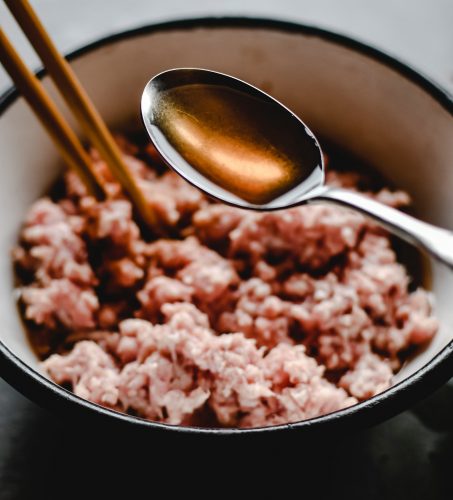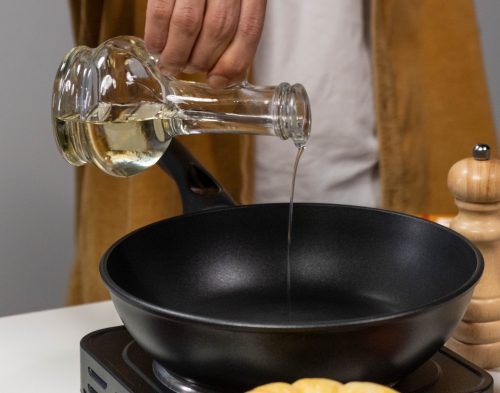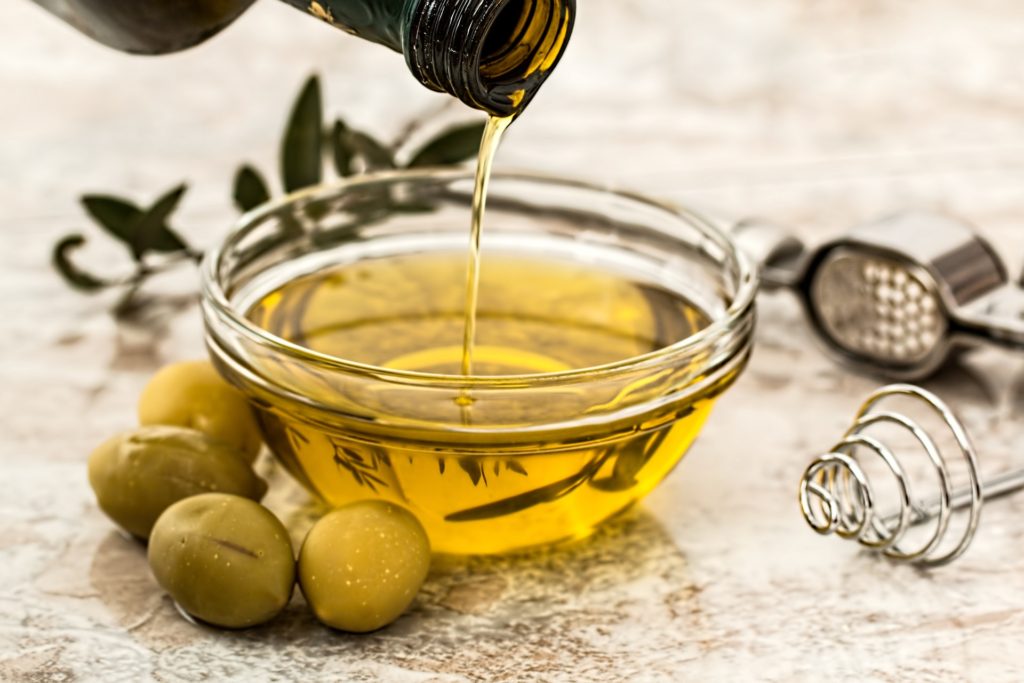There are so many cooking oils on the market today. Vegetable…canola…olive…coconut… avocado. And those are only a few of them. Many people just grab the cheap and accessible vegetable or canola oil off the shelf without a second thought. But, there are so many better options out there that can actually benefit your health instead of hurting it. Imagine cooking a meal where every ingredient you use impacts your health in a positive way. It’s possible, even with cooking oil as a component!

When choosing the correct oil to cook or bake with, there are a few key factors to consider.
What is the smoke point?
The smoke point is the highest temperature an oil can be cooked at before it burns and starts to smoke. Reaching the smoke point affects the taste and the nutrients in the oil, while also releasing harmful compounds called free radical. None of this is good!
How is the oil extracted?
Best rule of thumb is the least processed, the better. Refined oils are often treated with chemicals. There can be trace amounts of that chemical left in the oil. You don’t want that. It can also cause the oil to rancid or create trans fat in the process. Also not good. Refined oils have high smoke points, but minimal health benefits. Instead, you want to look for labels that say things like “cold-pressed”, “expeller pressed”, and “extra virgin”.
What is the oil's flavor?
Each oil has a unique flavor (or lack thereof in some cases), so you’ll want to keep that in mind based on the dish you’re preparing. If you’re going to heat the oil, a neutral flavor is generally your best bet. Save the oils with bold flavors for drizzles, dressings, and cold applications.
What is the omega-6 and omega-3 ratio?
Omega-6 and omega-3 fatty acids contain important polyunsaturated fatty acids that support good health. Our bodies cannot produce some of these fats, so it is important to get them into our bodies through consumption. The key is doing so with the right balance. Too much omega-6 fatty acids and not enough omega-3’s promotes inflammation. Because the modern diet tends to be high in omega-6 fats but low in omega-3’s, you’ll want to keep this in mind to try and balance that ratio.
What type of fatty acids are in the oil?
- Saturated fat – the effects of saturated fat on health is a very controversial topic. Some experts warn that consuming too much, or even moderate amounts, can negatively affect health. However, other experts argue that saturated fats aren’t inherently harmful and can be included as part of a healthy diet.
- Partially hydrogenated oils or trans fats – you DO want to stay away from these.
- Monosaturated fat – several studies suggest that regular use of oil rich in monounsaturated fats (like olive oil) may help reduce the risk of cardiovascular disease.
- Polyunsaturated fats – oils that have 50% or more polyunsaturated fat can become rancid more quickly. Additionally, the oil is compromised when heated, and free radicals are created. If you plan to heat the oil, you definitely don’t want to use one high in polyunsaturated fat.
So, what type of oils am I looking for?
You definitely want to avoid partially hydrogenated oils and trans fats. Beyond that, everything else in moderation is ok. The oils I’ll recommend below each have different combinations of the above categories, but all have health benefits. You’ll want to consult with your medical doctor if you have questions about what oils are right for your diet. In our home, we use several of the below oils to get a good balance and different health benefits. Before I share the healthiest oil choices, I want to share the oils that you want to avoid…and why.
Oils to Avoid
- Palm oil – is highly saturated and often found in processed foods, so it’s hard to avoid completely. There are much healthier oils to use at home.
- Canola oil – is highly processed (lacks nutrients), comes from a genetically modified source, and is extracted from hexane, which is a chemical derived from crude oil.
- Vegetable oil – is refined and highly processed, so it lacks flavor and nutrients. Gross.
- Soybean oil – a hydrogenated oil that may be connected with neurological disorders.
- Cottonseed oil – contains natural toxins such as gossypol.
- Corn oil – made from genetically modified corn, is highly refined and can produce harmful chemicals when heated. It has been linked to increased levels of inflammation, liver damage, heart disease, and obesity. It is high in omega-6 fatty acids.

Healthy Cooking Oils
Extra Virgin Olive Oil
- Look for: organic, cold-pressed extra virgin olive oil
- Smoking point: 350 degrees Fahrenheit (extra virgin)
- Benefits: high levels of beneficial monounsaturated omega-9 fatty acids, unique flavor, phytochemicals with potent antioxidant properties. Ideal for low to medium heat cooking (sauteing), baking, and salad dressings).
- Disadvantages: relatively low smoke point make it unsuitable for high temperature cooking. Best used on cold dishes, or added after the heat has been turned off. Its distinctive flavor may not be ideal for all dishes.
- This is a great option
Ghee
- Look for: organic, cold-pressed extra virgin olive oil
- Smoking point: 350 degrees Fahrenheit (extra virgin)
- Benefits: high levels of beneficial monounsaturated omega-9 fatty acids, unique flavor, phytochemicals with potent antioxidant properties. Ideal for low to medium heat cooking (sauteing), baking, and salad dressings).
- Disadvantages: relatively low smoke point make it unsuitable for high temperature cooking. Best used on cold dishes, or added after the heat has been turned off. Its distinctive flavor may not be ideal for all dishes.
- This is a great option
Coconut Oil
- Look for: organic, cold-pressed and unrefined, extra virgin
- Smoke point: 350 degrees Fahrenheit
- Benefits: virgin coconut oils offers a fresh coconut flavor, is low in polyunsaturated fats, does not turn rancid easily, has a long shelf life, and is a good source of lauric acid (heart-protective). Its antibacterial and antioxidant properties also make it a great choice for massage.
- Disadvantages: minimal omega-3 fats. Its strong coconut flavor and odor can make it overpowering with other food. Unrefined, virgin coconut oil, has a lower smoke point than its highly refined counterparts. It has high MCT (medium chain triglycerides) that may make it unsuitable for people with liver problems. Since the health impact of saturated fat is still up for debate, consumption should be moderated.
- This is a great option
Avocado Oil
- Look for: organic, extra virgin, cold-pressed / expeller-pressed
- Smoke point: 400 degrees Fahrenheit
- Benefits: high monounsaturated omega-9 fatty acids and vitamin E. Also high in phytosterols and polyhydroxylated fatty alcohols, both of which are anti-inflammatory in nature. The high smoke point makes it suitable for high-temp cooking such as stir frying or high heat baking.
- Disadvantages: not as common as other oils, so it’s rarity may result in higher costs.
- This is a great option
Macadamia Oil
- Look for: organic, virgin, cold-pressed
- Smoke point: 413 degrees Fahrenheit
- Benefits: high in total monounsaturated fatty acids, resistant to rancidity, long shelf life, a relatively balanced omega-6 to omega-3 ratio, low polyunsaturated fats, mild flavor, and relatively high smoke point. Suitable for stir frying, baking, and pan frying.
- Disadvantages: not an ideal choice for cold dishes (like salad) that need extra flavor from the oil
- This is a great option
Flaxseed Oil (AKA Linseed Oil)
- Look for: organic, cold-pressed, virgin, unrefined
- Smoke point: 225 degrees Fahrenheit
- Benefits: high in vitamin E, high in omega-3 fatty acids, has a unique, slightly nutty flavor.
- Disadvantages: its very low smoke point limits it to cold uses (like salad dressing). When exposed to heat, it can create dangerous chemicals. Store in the refrigerator for a longer shelf life.
- This is a great option
Sesame Oil
- Look for: organic, cold-pressed or expeller-pressed, unrefined, not to be confused with “toasted sesame oil”
- Smoke point: 350 degrees Fahrenheit
- Benefits: It has anti-inflammatory, antioxidant, and antimicrobial properties. It’s extremely versatile and can be used anywhere you might used canola oil due to its relatively neutral flavor.
- Disadvantages: not to be confused with toasted sesame oil, which is very strongly flavored.
- This is a great option
Grapeseed Oil
- Look for: “expeller-pressed”, avoid any that mention of hexane
- Smoke point: 420 degrees Fahrenheit
- Benefits: has a neutral flavor and a high smoke point that make it a versatile oil. It’s high in vitamin E and omega-3, -6, and -9 as well as antioxidants and anti-inflammatory compounds.
- Disadvantages: can be more expensive because it’s made from the tiny seeds of grapes. Since it has high levels of omega-6 fatty acids, it should be consumed in moderation.
- This is a great option
Walnut Oil
- Look for: organic, cold-pressed or expeller-pressed, unrefined, virgin
- Smoke point: 320 degrees Fahrenheit
- Benefits: has a good ratio of omega-6 to omega-3 fatty acids which helps fight inflammation. Has a rich nutty flavor. Compliments meats, salads, pasta, and even desserts. Drizzle over pancakes, fresh fruit, ice cream, or add to coffee creamer. However, it is best to add it just after cooking, as cooking it makes it taste bitter.
- Disadvantages: has a low smoke point, so it’s not good for cooking. Needs to be refrigerated to stay fresh.
- This is a great option
Sunflower Oil
- Look for: organic, cold-pressed or expeller-pressed, unrefined, high oleic
- Smoke point: 225 degrees Fahrenheit
- Benefits: high in vitamins E and K and both polyunsaturated and monounsaturated fatty acids, while low in saturated fat. It has a mild flavor.
- Disadvantages: there is some debate on whether this oil should be considered healthy or not. It has the above health benefits, but generates more aldehydes than other oils when used for deep frying, which creates toxic fumes. It has a low smoke point in the unrefined state, so it is not suitable for most cooking or baking. Since it is high in omega-6 fatty acids, it should be consumed in moderation to avoid inflammation.
- This is a great option
I know that was a lot of information I just threw at you, but I hope it was helpful. If you want to make healthier choices with your cooking oils, I encourage you to pick one of the good ones above and start experimenting with it! So, if you do a lot of baking, pick one that will be a good replacement for your baking oils. If you do a lot of stovetop cooking, start there. Most important thing is don’t get overwhelmed! Baby steps are okay, and quite honestly, more sustainable long term.

Some of the links above are affiliate links. This means that, at zero cost to you, I will earn an affiliate commission if you click through the link and finalize a purchase. Thanks for your support!
Resources:
- Best & worst cooking oils for your health
- 7 healthiest cooking oils and 3 to avoid
- How to choose the right oils for an anti-inflammatory diet
- Good fats versus bad fats
- Disentangling the Effects of Monounsaturated Fatty Acids from Other Components of a Mediterranean Diet
- Effects of Olive Oil and Its Minor Components on Cardiovascular Diseases, Inflammation, and Gut Microbiota
- A link between dietary factors and coronary heart disease
- Oils to cook with and oils to avoid
- Is sunflower oil good for you?
Related posts:
- Why Essential Oils Are…Essential If you’ve done even a small amount of researching online about natural health, chances are that you’ve come across essential oils. Their popularity is ever-growing both in the natural world...
- Anti-Inflammatory Diet One of the best ways to fight inflammation in your body does not come from a drug store. Instead, it comes from the grocery store. By simply choosing to incorporate...
- Gut Health: The Shocking Truth A healthy gut is foundational to a healthy you. The human gut does more than just digest food and absorb nutrients. There's a reason it's called the second brain. Your...
- Preventative Health & Wellness It's great to have so many options at our fingertips today to address various health and wellness concerns. But, I think we can agree that being preventative with our health...


